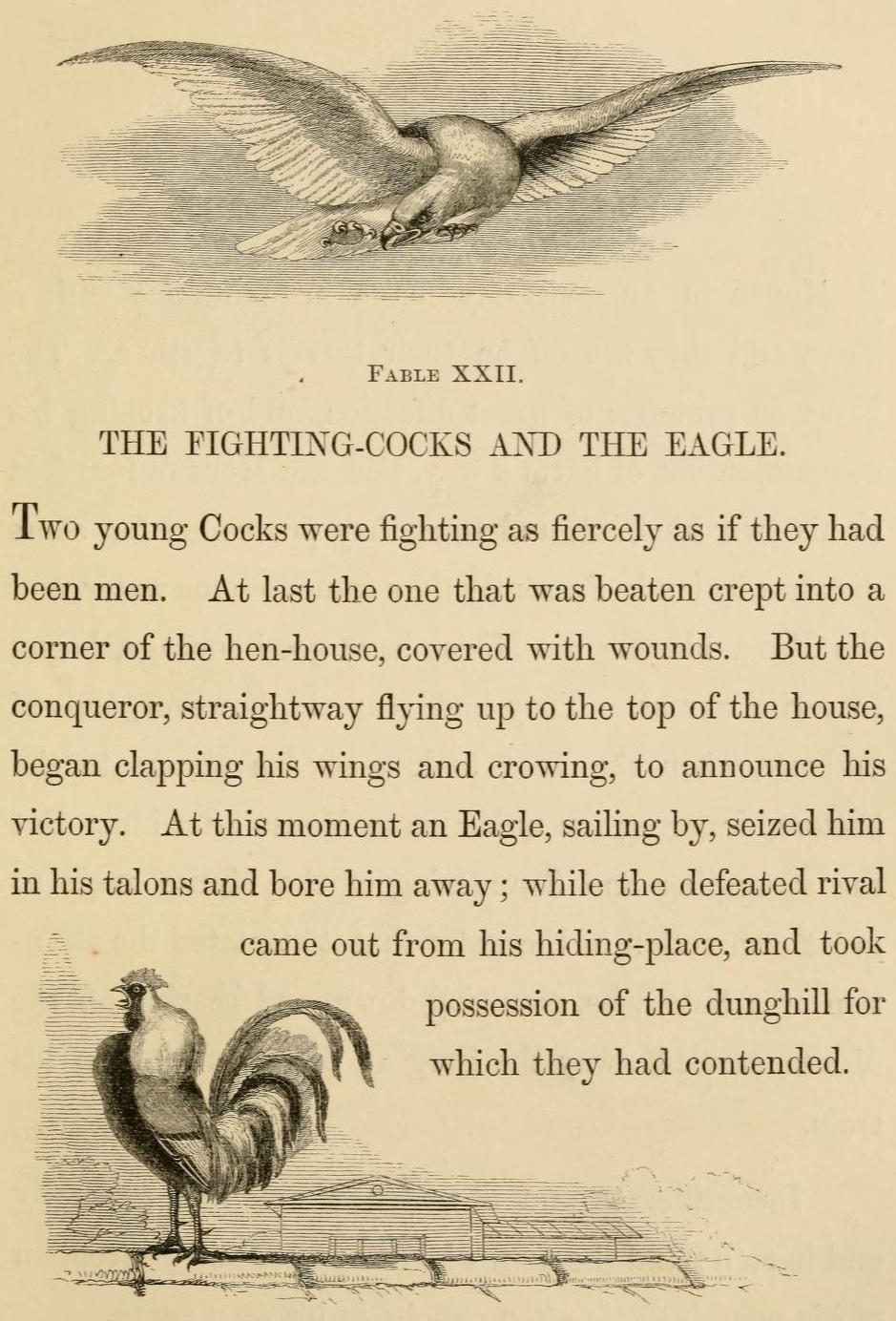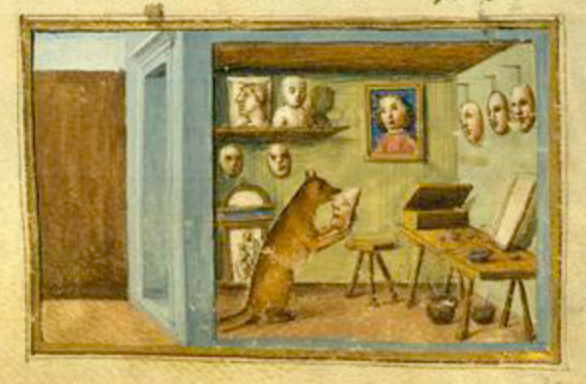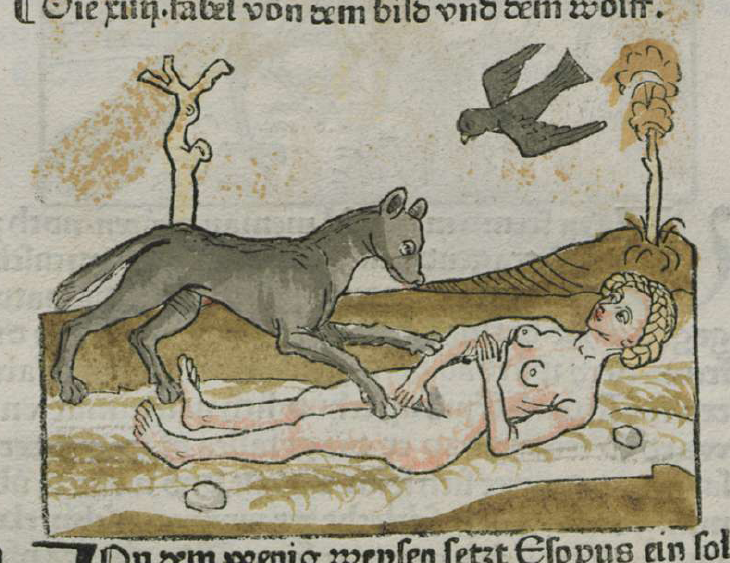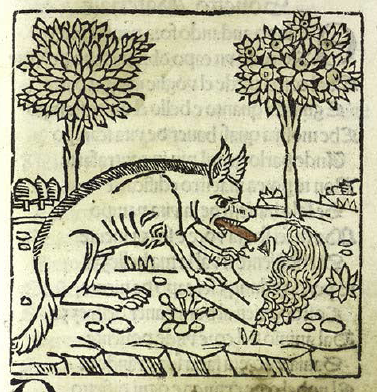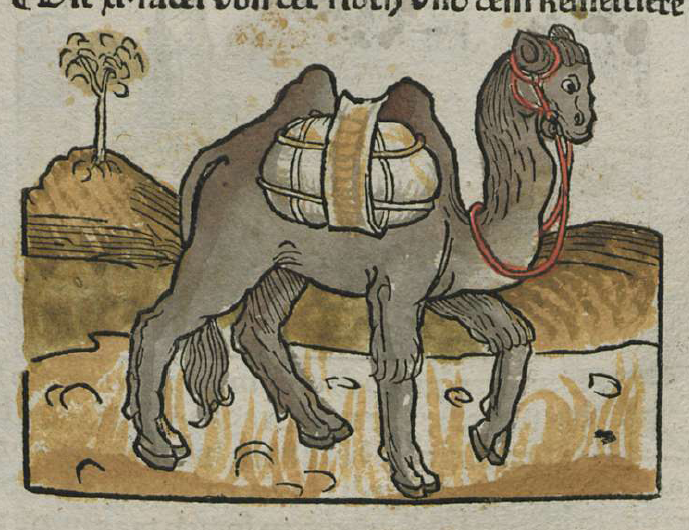Hector and I did something really different as part of our ongoing work on
the Latin fables of Desbillons (see
this post for more info); we've been focusing on the super-short poems, but this week we worked on a longer poem because it is really relevant to the kind of research Hector is doing in animal studies. Plus, it's just a great poem, a fable that is original to Desbillons and really well told!
12.7 Bos PhilosophusPhilosophus olim fama erat celeberrimus
Bos; Magna quid, ait, cornua ista me juvant
Ad consequendam quam volo sapientiam?
Supervacua sunt; immo plurimum nocent,
Per nemora namque quoties et silentibus
Sub umbris ambulo, sapientes ut solent,
Densis fruticibus arborumque ramulis
Retenta saepe turbant, et totus mihi
Multa meditanti adesse ne possim vetant,
Etiamque cogunt, saepius quam nos decet,
Meminisse nobis ipsa haec a Superis data,
Injurias possemus ut refellere,
Quibus adjumentis philosophi minime indigent.
Rogat ergo lanium cornua revellat sibi;
Monet ille videat porro prudens quid roget;
Id sine doloris sensu vix tolerabili
Non posse fieri. Falleris, bone vir, ait
Bos obstinatus: haec propago cornea
Sensum ipsa nec habet nec potest progignere
Neque illa nostro multum adhaeret vertici;
Labare visa nuper est, cum paululum
Obnixus inter mutuum nexas vepres
Arbusculasque mihi patefacerem viam;
Age modo propera. Lanius ergo paruit,
Sed cum ille tandem jussum quod fuerat opus
Efficere summis niteretur viribus,
Dolore victus repulit odiosam manum,
Immugiensque philosophus fugit procul.
Plerique facile dimissum iri quae putant
Ubi venit hora posse dimitti negant.
Here is the poem written out in English prose order to help in reading:
Olim philosophus erat,
celeberrimus fama,
bos!
Ait,
"Quid magna cornua ista
juvant me
ad consequendam sapientiam
quam volo?
Sunt supervacua;
immo
plurimum nocent
namque
quoties ambulo
per nemora
et sub silentibus umbris,
ut sapientes solent,
(cornua),
retenta densis fruticibus
et ramulis arborum,
saepe turbant
et vetant
ne possim
totus adesse mihi,
multa meditanti,
etiamque
cogunt meminisse,
saepius quam nos decet,
ipsa haec
a superis data (esse) nobis
ut possemus refellere injurias,
quibus adjumentis
philosophi minime indigent.
rogat ergo lanium
revellat sibi cornua;
ille (lanius) monet porro
(ut bos) videat, prudens, quid roget;
id non posse fieri
sine sensu doloris,
vix tolerabili.
Bos ait, obstinatus,
"Falleris, bone vir!
Haec cornea propago
ipsa nec habet sensum,
nec potest progignere (sensum),
neque illa multum adhaeret nostro vertici;
nuper
visa est labare
cum patefacerem mihi viam,
paululum obnixus
inter vepres et arbusculas mutuum nexas.
Age modo! Propera!"
Ergo lanius paruit
sed,
cum tandem
ille niteretur summis viribus
efficere opus
quod fuerat jussum,
philosophus,
dolore victus,
repulit odiosam manum
et fugit procul,
immugiens.
Plerique,
ubi hora venit,
negant
(haec) posse dimitti
quae facile dimissum iri
putant.
In ancient times and modern, philosophers have considered the question of animal consciousness, and in this fable, the animal himself has become a philosopher, and he is even giving the butcher orders! Yes, in the end, this "bos philosophus" is a fool whom Desbillons mocks, but not as a stupid animal; the ox is being mocked as a pretentious philosopher. The pretentious philosopher is often the butt of Aesopic humor, both in the fables and also in the
Life of Aesop where, for a time, Aesop is the slave of a philosopher whom he outwits repeatedly.
The meter is iambic, and here is some help with the meter (for more about iambic meter, see
the post about Desbillons 1.1).
Philoso·phus o·lim fam~ · erat · celeber·rimus
Bos; Mag·na quid a·it cor·nu~ is·ta me · juvant
Ad con·sequen·dam quam · volo · sapien·tiam?
Super·vacua · sunt; im·mo plu·rimum · nocent
Per nemo·ra nam·que quoti·es et · silen·tibus
Sub um·bris am·bulo, · sapien·tes ut · solent,
Densis · frutici·bus ar·borum·que ra·mulis
Reten·ta sae·pe tur·bant et · totus · mihi
Multa me·ditant~ · ades·se ne · possim · vetant
Etiam· que co·gunt sae·pius · quam nos · decet
Meminis·se no·bis ips~ · haec a · Superis · data
Inju·rias · posse·mus ut · refel·lere
Quibus ad·jumen·tis philo·sophi · minim~ in·digent.
Rogat er·go lani·um cor·nua re·vellat · sibi
Monet il·le vide·at por·ro pru·dens quid · roget
Id sine · dolo·ris sen·su vix · tolera·bili
Non pos·se fie·ri; Fal·leris, · bone vir, · ait
Bos ob·stina·tus: haec · propa·go cor·nea
Sens~ ip·sa nec ha·bet nec · potest · progig·nere
Nequ~ il·la nos·tro mult~ · adhae·ret ver·tici;
Laba·re vi·sa nu·per est · cum pau·lulum
Obnix·us in·ter mu·tuum · nexas · vepres
Arbus·culas·que mihi · patefa·cerem · viam
Age mo·do prope·ra. Lani·us er·go pa·ruit
Sed c~ il·le tan·dem jus·sum quod · fuerat · opus
Effice·re sum·mis ni·tere·tur vi·ribus
Dolo·re vic·tus repu·lit odi·osam · manum
Immu·giens·que philo·sophus · fugit · procul
Pleri·que faci·le di·miss~ i·ri quae · putant
Ubi ve·nit ho·ra pos·se di·mitti · negant.
And here's
an ox from a medieval bestiary who's looking very philosophical, and who also has some serious horns:
Meanwhile, for more Desbillons, here are the
other poems I've posted so far here at the blog. :-)
